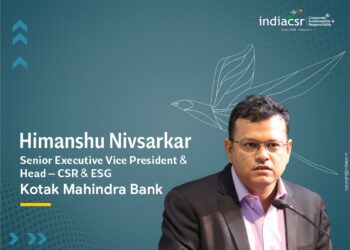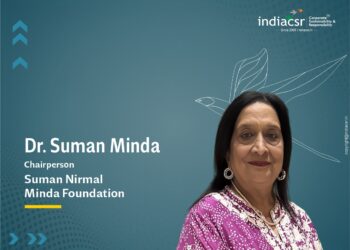Swaniti Initiative helps improve governance systems and improve civic engagement by activating and leveraging the power of systems, data and networks. In an interview with India CSR, Rwitwika Bhattacharya, organisation’s CEO talks about its mission, activities, achievements and future plans. Excerpts:
Tell us a bit about Swaniti Initiative and current programmes.
Swaniti was founded with the belief that strong governance institutions can ensure access to equal opportunity and lift people out of poverty. We have noticed that decision makers across South Asia have the aspiration to provide sustainable change but are limited by a lack of human capital, and insufficient data-driven knowledge and insight to target the areas which are most affected. We believe that we have an opportunity to create massive impact by following a 3-fold approach of activating and leveraging the Power of Systems, data and Network. Our approach combines in-depth experiences on ground, technology and key decision maker inputs to solve the challenges. We do in -depth research, program implementation support through catalytic intervention, and technological innovation. This process helps us to undertake a range of activities that increase the capacity of politicians, improve governance systems, fight misinformation and improve civic engagement.
We support governments and other nodal agencies on projects across sectors, with the aim of delivering development services to help in mobilising government programmes. Our work is divided into two sectors: one that focuses on providing local support through district administrators and lawmakers and another that focuses on providing state government with support.
What are the new policies Swaniti is working on?
Swaniti has always been evolving its policies in line with the current challenges which need to be addressed to bring a sustainable change in society. In line with that, the new policies that our organisation has been working on are as follows:
Swaniti has transformed its way of working on core government parameters. We have started working on data-based decision making which focuses on community feedback. Its uniqueness is its entitlements-based delivery which enables bottom-up planning.
In the current times, addressing issues related to climate change has become a necessity. Our team has been constantly trying to address the issues related to climate change as part of our state projects in a unique way. We have started to address the issues of climate change from the lens of livelihood generation. Our state projects in Jharkhand, Himachal Pradesh have started addressing issues from this lens. Our projects in the pipeline are also focusing on issues from the same lens.
We at Swaniti believe that to achieve a long-term change, our public servants need to be efficiently trained. Thus, our core policy approach also focuses on capacity building of Grade 2 and grade 3 government officers, to ensure strengthening of institutions.
How is Swaniti helping the AP government?
Our intervention is aimed at increasing inclusion of vulnerable populations in government schemes by 25-30%. We noticed that Social development challenges in Andhra Pradesh are manifold: Due to the pandemic and migrant worker crisis, migrants have moved back to the rural areas in Andhra Pradesh; some of them may never go back to their urban jobs and will resort to practising agriculture for income.
Further, there is a need to ensure economic parity in the Rayalseema region and northern coastal districts in Andhra Pradesh. High unemployment rate and poor health indicators also persist in tribal and drought-prone parts of the state. We developed a three-tier strategy for this intervention. We started with identifying the bottleneck problems by conducting on-the- ground assessment of programmes, identifying systemic gaps and issues, and proposing feasible ideas. Then we started implementing the policy changes by working with the administration to build capacity and support, and identifying ways to substantively institutionalise program support. And ensure policy changes through introducing systemic changes in policy design process, and institutionalising cultural change in policy processes.
The schemes adopted for this intervention are Rythu Bharosa, financial assistance scheme providing ₹13,500 to farmers every year, REWARD scheme for efficient water management, soil fertility improvement, adoption of standard agricultural practices and enhancement of cultivation, MGNREGA (Livelihood & Employment), and Unnathi scheme for providing sustainable livelihood opportunities and income generation to the most vulnerable and economically-disadvantaged communities.
How have things changed after the intervention?
The success of the Andhra Pradesh project has been unprecedented, our bottom’s up approach has led to systematic reforms which ensure long term sustainability.
Few of our notable impacts in the state project include a 99.7 percent reduction in payment rejection errors for MGNREGS, New job cards tagged to more than 7 lakh households, new livelihood opportunities for more than 2 lakh households, 100% women mates deployed for MGNREGS, and 86% reduction in time taken for grievance redressal by deploying Jaano.
Any other region Swaniti is looking to start working in?
Swaniti has been working with various state governments and leveraging data and technology to enable last-mile public service delivery for the most marginalised communities. Given the organisation’s experience in implementing similar solutions we are planning to replicate our work in the north-east region and Uttar Pradesh . We have also started working extensively on the ‘Village volunteer model’ to ensure last mile delivery of solutions.
The North East region remains underdeveloped as compared to the rest of the country, with access and inclusion for vulnerable communities being a key challenge. In the past Swaniti has worked in Tripura and Manipur to ensure better delivery of DBT schemes by setting up PFMS platforms. Drawing from this experience, we now aim to catalyse the geography by working on state-specific challenges and providing bottom up solutions supported by robust grievance redressal mechanisms for efficient and inclusive last mile public service delivery.
Swaniti aims to build on the key opportunities discussed above to bring about catalytic change in the region.
Uttar Pradesh Village volunteer programme
The Gram Mitra’s (Village Volunteers) program is designed to ensure that the most marginalised communities in Uttar Pradesh are able to benefit from the ongoing government programs. Communities will have access to an informed “local point of contact” who can support them in getting access to existing programs and reporting back to the government on possible issues being faced.
These Gram Mitra will be on the front lines of all government programs. But their role will be working across various sectors to ensure the programs like social security, pension, scholarship etc. are delivered timely. To ensure that the program has been designed in an inclusive manner, our plan is to focus on:
- Reaching out to the Gram Panchayat through the administration to get their feedback on current gaps and how a local youth can be utilised in ensuring that these gaps are overcome.
- Identify nodal officers at a block level who are responsible for the requisite Gram Mitras.
- Provide training like how to conduct a feedback survey, enter data and coordinate with the administration
- Register them within a government portal that can also provide the requisite reporting systems.
- Institutionalise the creation of a Gram Mitra system.
It is mentioned that more than 5 million people have benefited from Swaniti interventions. Could you please elaborate on how you and your team have made it possible?
Swaniti worked extensively on getting insights from the ground so that the voice of the beneficiaries were taken into consideration while developing the project. For this purpose, Focus Group Discussions were extensively used as a data collection tool. They undertook a sampling exercise, statistically derived from socio-economic indicator analysis with specific emphasis on vulnerable communities. Consistent pattern of taking feedback from community members was important because it helped identify the major challenges impeding the successful implementation of key government schemes. This also helped build community connections and informed the team of real-time issues, which could get resolved through direct government intervention.
Upon successful collection of on-ground insights, the Swaniti came up with policy recommendations which were submitted to the concerned government departments. These recommendations were then accepted and are being implemented to ensure maximum access and inclusion for vulnerable communities.
An example of one such intervention as a part of the project was – Reducing the dropout of households from MGNREGA. Due to payment rejections, there were numerous households which were being dropped out of the MGNREGA scheme; the team at Swaniti flagged this problem and worked on resolving this issue. Post intervention, there was a direct impact on 50,000 households which account for nearly 2.5 lakh members in a family. Many such interventions for different departments in Andhra Pradesh resulted in 5 million people being positively impacted.























